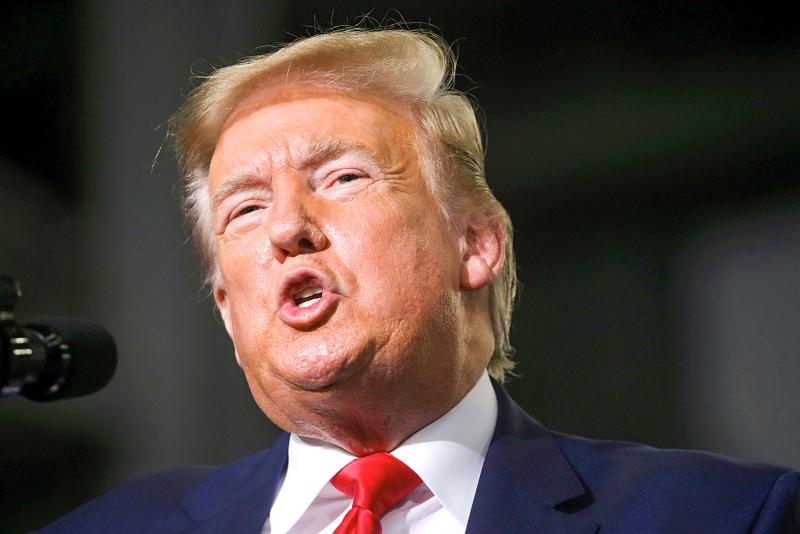US President Donald Trump has been forced to cancel a planned face-to-face summit of G7 leaders this month and now wants to host an expanded meeting in September dedicated to countering China to which Russian President Vladimir Putin would be invited.
Trump on Saturday announced that he had canceled the June meeting, which he had billed as a symbol of the US “transitioning back to greatness,” after German Chancellor Angela Merkel told him in a telephone call that she saw the summit in Washington as a health risk.
Hundreds of security staff, journalists and officials also attend the two-day summits.

Photo: Reuters
Reports suggest the call between Merkel and Trump on Thursday was stormy, ranging from German plans for the Nord Stream gas pipeline, to Hong Kong and the potential health risks of a face-to-face summit.
Trump’s new plan, outlined to reporters aboard Air Force One on Saturday, is to host an expanded G7 meeting — including Russia, Australia, South Korea and India — dedicated to building an alliance against China.
The plan is likely to be controversial because Russia has been banned from Western-led summits since Putin’s annexation of Crimea in 2014, and is not seen as a natural ally in the defense of human rights in Hong Kong.
Merkel and French President Emmanuel Macron would also be reluctant to provide Trump with a prestigious platform to set out his China strategy weeks before the US presidential election.
Justifying the cancelation of this month’s meeting and his proposed new format, Trump said the current makeup of the group was “very outdated” and does not properly represent “what’s going on in the world.”
He said he had not set a precise date for the new meeting, but suggested it might be around the time of the annual UN General Assembly in New York City, which is normally held in September, but there is no guarantee it will go ahead this year.
The proposed “G11” meeting might also be held after the presidential election, he said.
The G7 brings together the US, Japan, France, Germany, the UK, Canada and Italy, and the US holds the presidency this year.
The Japanese Ministry of Foreign Affairs had been reluctant to see Japanese Prime Minister Shinzo Abe attend, as he would have been required either to quarantine himself for two weeks or take a COVID-19 test on his return.
Officials told Japanese media they did not want Abe to be seen to be getting privileged treatment, and cited the backlash British Prime Minister Boris Johnson has faced for clearing his senior adviser of breaking the UK’s quarantine rules.
Macron was also reported to be ambivalent about a face-to-face meeting this month, and Merkel’s spokesman broke the news that she could not guarantee her personal attendance.
The White House had previously said the huge diplomatic gathering would be a “show of strength” when world economies are reemerging from shutdowns.
Additional reporting by AFP

FREEDOM OF NAVIGATION: The UK would continue to reinforce ties with Taiwan ‘in a wide range of areas’ as a part of a ‘strong unofficial relationship,’ a paper said The UK plans to conduct more freedom of navigation operations in the Taiwan Strait and the South China Sea, British Secretary of State for Foreign, Commonwealth and Development Affairs David Lammy told the British House of Commons on Tuesday. British Member of Parliament Desmond Swayne said that the Royal Navy’s HMS Spey had passed through the Taiwan Strait “in pursuit of vital international freedom of navigation in the South China Sea.” Swayne asked Lammy whether he agreed that it was “proper and lawful” to do so, and if the UK would continue to carry out similar operations. Lammy replied “yes” to both questions. The

SECOND SPEECH: All political parties should work together to defend democracy, protect Taiwan and resist the CCP, despite their differences, the president said President William Lai (賴清德) yesterday discussed how pro-Taiwan and pro-Republic of China (ROC) groups can agree to maintain solidarity on the issue of protecting Taiwan and resisting the Chinese Communist Party (CCP). The talk, delivered last night at Taoyuan’s Hakka Youth Association, was the second in a series of 10 that Lai is scheduled to give across Taiwan. Citing Taiwanese democracy pioneer Chiang Wei-shui’s (蔣渭水) slogan that solidarity brings strength, Lai said it was a call for political parties to find consensus amid disagreements on behalf of bettering the nation. All political parties should work together to defend democracy, protect Taiwan and resist

By refusing to agree spending increases to appease US President Donald Trump, Spanish Prime Minister Pedro Sanchez threatened to derail a summit that NATO Secretary-General Mark Rutte needs to run smoothly for the sake of the military alliance’s future survival. Ahead of yesterday’s gathering in The Hague, Netherlands, things were going off the rails. European officials have expressed irritation at the spoiler role that Sanchez is playing when their No. 1 task is to line up behind a pledge to raise defense spending to 5 percent of GDP. Rutte needed to keep Spain in line while preventing others such as Slovakia

SHIFT PRIORITIES: The US should first help Taiwan respond to actions China is already taking, instead of focusing too heavily on deterring a large-scale invasion, an expert said US Air Force leaders on Thursday voiced concerns about the Chinese People’s Liberation Army’s (PLA) missile capabilities and its development of a “kill web,” and said that the US Department of Defense’s budget request for next year prioritizes bolstering defenses in the Indo-Pacific region due to the increasing threat posed by China. US experts said that a full-scale Chinese invasion of Taiwan is risky and unlikely, with Beijing more likely to pursue coercive tactics such as political warfare or blockades to achieve its goals. Senior air force and US Space Force leaders, including US Secretary of the Air Force Troy Meink and